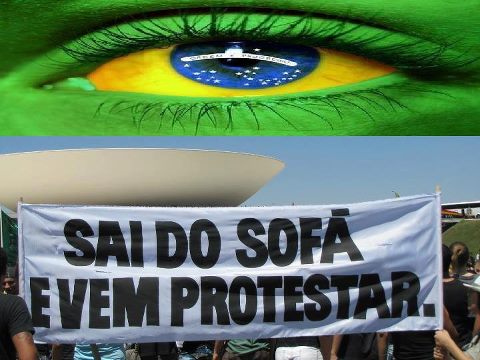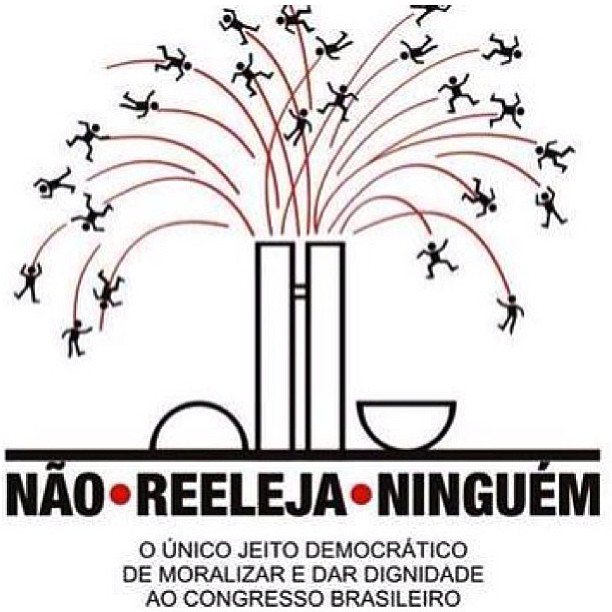"Sorry for Disturbing: We're Trying to Change Brazil": Brazilian Youth, Civic Media, and The Protests
/This spring, my Civic Paths Research Group was lucky enough to be able to host a visit by Carla Mendonça, a journalist and a Doctoral candidate at the Research Center and Graduate Program on the Americas at the Institute of Social Sciences of University of Brasília in Brazil. Her primary research interest is in drawing comparisons between the roles new media is playing in the political lives of American and Brazilian youth. She sat in on our weekly research meetings and also participated actively in a PhD seminar I was running focused on Civic Media and Participatory Politics. She arrived back home just in time to see some significant political rallies across her country and she has been sharing via our group's discussion forum some of the kinds of new media practices that have been a part of this protest and reform movement. This story has been under-reported in the U.S. media, compared to really important stuff like what's been said inside the Big Brother House. :-) So, I wanted to share with you today her account of what's been happening on the ground there and her selection of some key examples of the memes and videos being produced and circulated by this mostly youth led movement.
"Sorry for disturbing: we’re trying to change Brazil":
Brazilian Youth, Civic Media and the Protests –
by Carla Mendonça
Brazil is known for its cultural diversity. We have exciting music and spectacular dances. Our media is recognized for its tela novellas and advertisements. Nowadays, we are the second largest community – behind the United States -- on Facebook. We are known for our creativity, our warmth, and our diversity.
Throughout the last decades, Brazilians have also made progress in achieving formal democracy, in creating more jobs and providing better wages, and in expanding access to the education system. For many, the World Cup and the Olympic Games represented the promise of increased global visibility and of bringing more foreign investments into our country.
This winter -- it's winter in Brazil now -- we have also gained visibility as another country which has used network communications to inspire a grassroots movement for social change. What’s happened in cities across Brazil show strong parallels to the Spanish Indignados, the Occupy Wall Street movement, the various Arab Spring uprisings: protests across our country have some of the same spirit as the world saw displayed in Egypt’s Tahrir Square.
As these protests have moved forward since June, we are seeing Brazilian youth demonstrate a great understanding of how to use the internet and transmedia for civic engagement purposes. As Henry Jenkins contends, civic media is “any use of any technology for the purposes of increasing civic engagement and public participation, enabling the exchange of meaningful information, fostering social connectivity, constructing critical perspectives, insuring transparency and accountability, or strengthening citizen agency”.
The polling institute Datafolha Research found that most of the protesters in the streets are 26-35 years old and don’t have any political party preference. More than 80% of them follow the movement through Facebook.
(Leave the couch and come to protest)
The movement started in March in the southern town Porto Alegre: the initial action was directed against a proposed increase in the public transportations’ fares. In June, 14th, in Sao Paulo, after weeks of tentative protests for the same reason, students tried again to protest in a main street of the biggest Brazilian city, where the buses' fares had increased R$ 0,20 – about US$ 0,10. Police violently repressed the protesters to make the traffic free.
Brazilian protests are brutally dispersed by the police
The following day, videos, photos and testimonies about the confrontation between undergraduate students and soldiers were spreading across the internet and social networks. The content was shocking, and even people that were not participating in the events started to support the movement. Police tried to control the protests, especially, in Sao Paulo, Rio and Brasilia, while the biggest Brazilian media corporation – Rede Globo – called the students “delinquents”. To work around those obstacles, activists deployed transmedia practices to report what was happening in the streets and mobilize the public.
In the eye of the storm
That weekend, protests expanded from the South to the North. Millions of people went to the streets in big cities. Police retreated and media started to call the students “protesters” instead of “delinquents”.
.
A meme
(Sorry for disturb the traffic, we’re trying to change Brazil)
 The increase of the public transportation's fares was the trigger, but other issues are being brought to the streets. Protesters are asking for change. They want better public services on education, health and public transportation, the jailing of corrupt politicians, and they don’t accept the huge amounts of public money that are being spent on the World Cup. People are saying they would prefer that money be focused on education and health systems rather than on stadiums.
The increase of the public transportation's fares was the trigger, but other issues are being brought to the streets. Protesters are asking for change. They want better public services on education, health and public transportation, the jailing of corrupt politicians, and they don’t accept the huge amounts of public money that are being spent on the World Cup. People are saying they would prefer that money be focused on education and health systems rather than on stadiums.
No, I'm not going to the World Cup
A meme
(Kick Fifa – Mr. Politicians, the party is over – The State is made by the people, with the people and for the people)
As with other decentralized protest movements that have sprung up around the world, the absence of a strong leadership within the movement has made it difficult for them to negotiate with government authorities. On internet, some attempted to consolidate their agenda and make clear proposals.
19 de Junho de 2013 04 38
Translation:
We will be simple and direct!
The radio and television media say that we don’t have a specific cause.
It can weaken the movement.
The decrease of the public transportations’ fares is not enough for us,
but actually we need to know how to start a new Brazil.
So we are raising five straight causes without religious or ideological inferences,
without political parties’ flags or subjectivities.
We are going to raise moral causes that are unanimous accepted.
And we are going to raise few of them for a while in order to keep them strong.
We will call them The Five Causes!
The five causes are:
1) Not to PEC 37 (an amendment to the Brazilian Constitution).
2) The quick renunciation by senator Renan Calheiros of the presidency of the National Congress.
3) Quick investigation by Federal Police and District Attorneys and punishment of illegalities in World Cup’s constructions.
4) A law that defines corruption as a heinous crime.
5) The end of the privileged forum for politicians because it is an offense to our Constitution.
Repeat, shout, retweet, and share.
Download this video and post on your social networks accounts before it is deleted from internet.
You will see that your son don’t give up the fight (sentence from the Brazilian anthem).
Despite some criticism of the movement by journalists and political analysts, all local governments decided don’t raise the public transportations’ fares anymore. Even so, protesters kept engaged, demanding better health and education systems, less corruption, and bringing more and more issues to the streets.
A Brazilian president Dilma Rousseff`s meme
(The Queen of the Cups)
A Congress meme (it is the Brazilian Congress shape)
(Don’t re-elect any congressman – The democratic way to give dignity to the Brazilian Congress)
After three weeks under pressure, the main political institutions started to announce some propositions. President Dilma Rousseff, for example, announced the intention to start a process to reform the country’s political institutions. Some of the quick answers from the political institutions included:
- Mayors of 104 cities in 17 states (Brazil has 27 states) canceled increases in public transportation fares.
- Federal Government: 1) called a meeting with mayors and governors to discuss an agreement for education, health and urban mobility; 2) called a meeting with some movements’ leaders; 3) announced the intention to start a political institutions' reform process in the country.
- The Congress: 1) voted and didn’t approve an amendment to the Brazilian Constitution (PEC 37) that has been proposing restrictions to Ministério Público, an institution similar to the District Attorneys; 2) approved a law that defines corruption as a heinous crime; 3) approved that 100% of the money from oil royalties will be invested on education and health; 4) canceled the July recess.
- Supreme Court ordered the arrest of a congressman judged guilty of corruption in 2010.
Signs are that the government is responding to this popular movement, and more is yet to come.
Brazilian Spring – Enough! Brazil is of the Brazilian people!
Things did not fall from the sky
The movement was organized by young people, creatively, via internet, working in networks, adding a Brazilian face to this global phenomenon. Young Brazilians used the communication via internet and transmedia exchanging meaningful information, they fostered social connectivity, they constructed real critical perspectives, and they strengthened citizen agency. Thus, they strengthened their social bonds and created a strong sense of civic engagement and collective empowerment.
Civic action is essential for democracy. Those young people have shown that they can know how to deploy civic media to push for a more democratic society and for policies that better represent their values.
Carla Mendonça is a journalist and a Doctoral candidate at the Research Center and Graduate Program on the Americas at the Institute of Social Sciences of University of Brasília, in Brazil. Last semester, Carla worked on her Doctoral dissertation research at Annenberg School for Communication and Journalism at University of Southern California thanks to a grant from Capes Foundation, an agency under the Ministry of Education of Brazil. She is comparing how young Brazilians and Americans use technology for civic engagement and participatory politics.
While we are on the subject of participatory politics, I also wanted to share with you today a powerful video on the George Zimmerman verdict, produced by the Black Youth Project. Cathy Cohen, who is a fellow member of the MacArthur Foundation's Youth and Participatory Politics Research Network, was hosting a convening of more than 100 black youth activists this weekend and they collectively decided to issue a statement about the Trayvon Martin Case and the issue of violence directed against black youth. The video is simple, direct, and poignant: it carries the moral weight of a new generation of political leaders as they grapple with some of the most difficult issues of our time. You will want to watch this.






